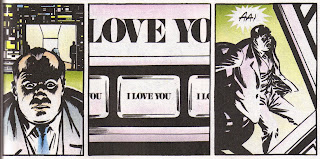In this section, the leader of the totalitarian government, Adam Susan, and the terrorist, V, each explain their 'version' of law. In the case of Adam Susan, the law is identified with the 'fate' computer that helps the leader monitor the populace through the myriad of video cameras planted in public and private spaces throughout the city. He refers to this computer as if it were a courtly lover, the impossibly removed lady who denies him her affection. Nonetheless, he asserts, 'My love, I would stay with you forever, would spend my life within you. I would wait upon your every utterance and never ask the merest splinter of affection, Fate... Fate... I love you' (39.1-3).

Susan's elevation of his cold, distant, technological 'lady', who punishes him by denying him her affections, enacts a disavowal of his own sexual desire. Since the fate-computer stands in for the law, his personal relationship to it speaks larger questions of how those in power relate to it.
If one approaches this issue from a psychoanalytic perspective one discovers how the idealization of the law as an untouchable 'courtly lady' does not speak to some purified, spiritual love for it, as Susan's monologue appears to suggest, but instead reflects the structure of masochism: the more ideal she becomes, the more the one courting her suffers unrequited love.
As Zizek writes in his article 'From Courtly Love to the Crying Game', the idealized lady 'functions as an inhuman partner in the precise sense of a radical Otherness which is wholly incommensurable with our needs and desires; as such, she is simultaneously a kind of automaton, a machine which randomly utters meaningless demands' (96). There is neither a relationship of empathy possible with such an entity nor through such an entity. The idealization of the law in this way evades the traumatic, alienating character of the sort of law 'Norsefire' has imposed on Vendetta's near-future Britain.
As I mentioned, this idealization also represents a disavowal of sexual desire (or libidinal investment of any sort). As Susan admits, he has 'never known the peace that lies between the thighs of a woman' yet he finds comfort in the fact that he is 'respected' and 'feared' (38.3) and has a 'love that is far deeper than the empty gasps and convulsions of brutish coupling' (38.4). For Susan, his love of the 'law' is opposed to the consumation of sexual desire. His self-punishing pleasure (jouissance) comes from the perpetual deferment of his desire.
In contrast, as I have pointed out below, V uses a directly sexual language to address the law, accusing justice of being a 'whore' who has 'bedded another'. Whereas Susan disavows sexual desire as a motive force animating his love of the law, V, as is often the case in Vendetta, brings this repressed material back into the open. V shows how for Susan, doing his duty is not an act of supreme self sacrifice (as he frames it), but instead testifies to a plesure-pain animating the maintenence of law.
When V takes control of the fate computer -- indeed he has been monitoring it from the beginning -- he sends back to Susan his message in an inverted form. Appearing on the screen in front of the leader are the words 'I love you' (

 What should we make of this detail? Why does this unexpected message consume Susan for the rest of the novel? Is this another case of 'the abyss gazes also'?
What should we make of this detail? Why does this unexpected message consume Susan for the rest of the novel? Is this another case of 'the abyss gazes also'?Is Moore advocating a 'universal love'? If so, how might it relate to the 'love' Evey feels for Valerie following her impriosnment, for instance? What are the problems that this raises? Do any of Moore's other texts advocate this sort of solution? Doe she complicate it at all?

No comments:
Post a Comment